留学生作业网
- 格式:doc
- 大小:51.50 KB
- 文档页数:1
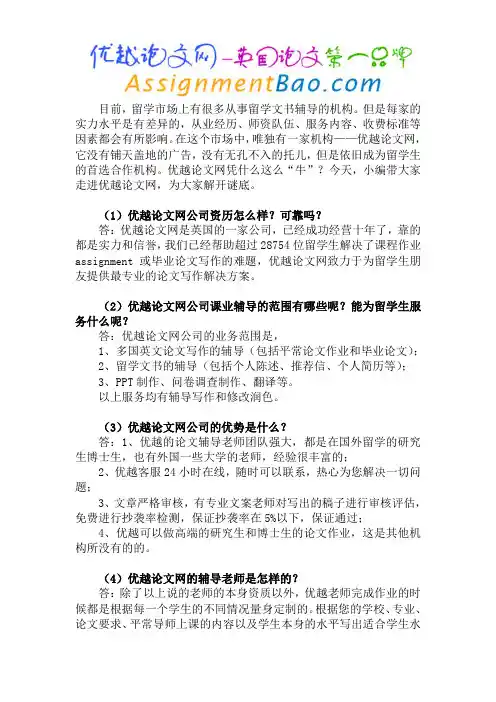
目前,留学市场上有很多从事留学文书辅导的机构。
但是每家的实力水平是有差异的,从业经历、师资队伍、服务内容、收费标准等因素都会有所影响。
在这个市场中,唯独有一家机构——优越论文网,它没有铺天盖地的广告,没有无孔不入的托儿,但是依旧成为留学生的首选合作机构。
优越论文网凭什么这么“牛”?今天,小编带大家走进优越论文网,为大家解开谜底。
(1)优越论文网公司资历怎么样?可靠吗?答:优越论文网是英国的一家公司,已经成功经营十年了,靠的都是实力和信誉,我们已经帮助超过28754位留学生解决了课程作业assignment或毕业论文写作的难题,优越论文网致力于为留学生朋友提供最专业的论文写作解决方案。
(2)优越论文网公司课业辅导的范围有哪些呢?能为留学生服务什么呢?答:优越论文网公司的业务范围是,1、多国英文论文写作的辅导(包括平常论文作业和毕业论文);2、留学文书的辅导(包括个人陈述、推荐信、个人简历等);3、PPT制作、问卷调查制作、翻译等。
以上服务均有辅导写作和修改润色。
(3)优越论文网公司的优势是什么?答:1、优越的论文辅导老师团队强大,都是在国外留学的研究生博士生,也有外国一些大学的老师,经验很丰富的;2、优越客服24小时在线,随时可以联系,热心为您解决一切问题;3、文章严格审核,有专业文案老师对写出的稿子进行审核评估,免费进行抄袭率检测,保证抄袭率在5%以下,保证通过;4、优越可以做高端的研究生和博士生的论文作业,这是其他机构所没有的的。
(4)优越论文网的辅导老师是怎样的?答:除了以上说的老师的本身资质以外,优越老师完成作业的时候都是根据每一个学生的不同情况量身定制的。
根据您的学校、专业、论文要求、平常导师上课的内容以及学生本身的水平写出适合学生水平的文章。
老师很专业、认真、负责,保质保量完成,如果学生有要求提出来,辅导老师会进行修改,保证通过,绝对没有问题。
同时您的文章也绝对不会泄露,给另外一个人使用,应为要求、水平、风格都不一样,这个留学生可以放心。
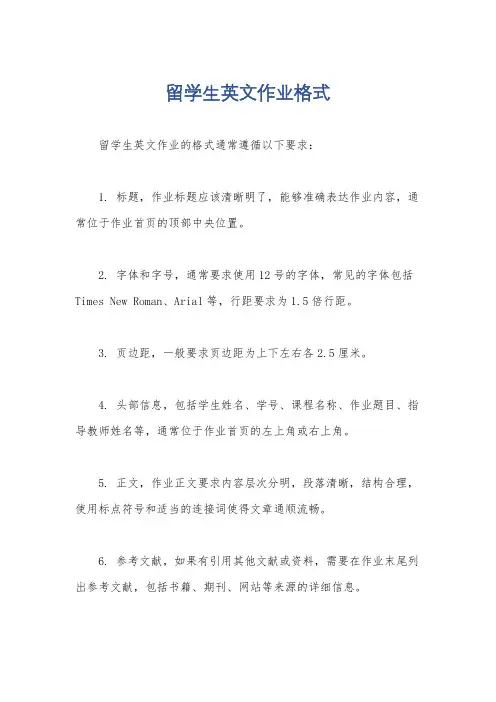
留学生英文作业格式
留学生英文作业的格式通常遵循以下要求:
1. 标题,作业标题应该清晰明了,能够准确表达作业内容,通常位于作业首页的顶部中央位置。
2. 字体和字号,通常要求使用12号的字体,常见的字体包括Times New Roman、Arial等,行距要求为1.5倍行距。
3. 页边距,一般要求页边距为上下左右各2.5厘米。
4. 头部信息,包括学生姓名、学号、课程名称、作业题目、指导教师姓名等,通常位于作业首页的左上角或右上角。
5. 正文,作业正文要求内容层次分明,段落清晰,结构合理,使用标点符号和适当的连接词使得文章通顺流畅。
6. 参考文献,如果有引用其他文献或资料,需要在作业末尾列出参考文献,包括书籍、期刊、网站等来源的详细信息。
7. 格式要求,根据具体学校或老师的要求,可能还需要包括页眉、页脚、段落缩进、行首缩进等格式要求。
总的来说,留学生英文作业的格式要求严谨规范,需要遵循学校或老师的要求,并且注意排版整洁、内容清晰、结构合理。

【视频开头】(画面:航拍镜头下的校园,学生们穿梭在绿树成荫的小道上,背景音乐轻快)旁白:“当你踏上这片陌生的土地,你是否会好奇,留学生活究竟是一幅怎样的画卷?今天,就让我们一起走进留学生活,感受异国他乡的青春足迹。
”【第一篇章:初识异国文化】(画面:留学生抵达机场,兴奋地与家人挥手告别,随后在校园里寻找宿舍)旁白:“初来乍到,面对异国的文化冲击,我们首先要学会的是尊重和理解。
在这里,我们不仅要适应新的学习环境,还要深入了解当地的风俗习惯。
”(画面:留学生参加文化体验活动,尝试制作传统美食,与当地人交流)旁白:“通过参与各种文化体验活动,我们不仅品尝到了地道的美食,还学会了与不同背景的人交流,这无疑是一次宝贵的人生经历。
”【第二篇章:课堂上的青春风采】(画面:留学生认真听讲,积极参与课堂讨论,课后与同学一起研究课题)旁白:“在这里,我们迎来了充满挑战的学术生涯。
面对严谨的学术氛围,我们勇敢地迎接挑战,展现出青春的风采。
”(画面:留学生参加学术竞赛,荣获佳绩,分享喜悦)旁白:“每一次的学术竞赛,都是对我们能力的考验。
在团队合作中,我们学会了如何分工合作,如何在压力下保持冷静,最终收获了满满的成就感。
”【第三篇章:校园生活的点点滴滴】(画面:留学生参加社团活动,展示才艺,与同学们一起度过难忘时光)旁白:“校园生活丰富多彩,在这里,我们找到了志同道合的朋友,一起分享喜怒哀乐。
”(画面:留学生参加户外拓展活动,克服困难,增强团队凝聚力)旁白:“户外拓展活动让我们在紧张的学习之余,放松身心,增强团队凝聚力,让我们在异国他乡感受到了家的温暖。
”【第四篇章:感悟成长】(画面:留学生与家人通电话,分享留学生活,眼中充满思念)旁白:“异国他乡的留学生活,让我们学会了独立,学会了担当,也让我们更加珍惜亲情。
”(画面:留学生毕业典礼,穿上学位服,自豪地接过证书)旁白:“时光荏苒,我们即将结束这段美好的留学生涯。
回首过去,我们收获了知识,收获了友谊,更收获了成长。
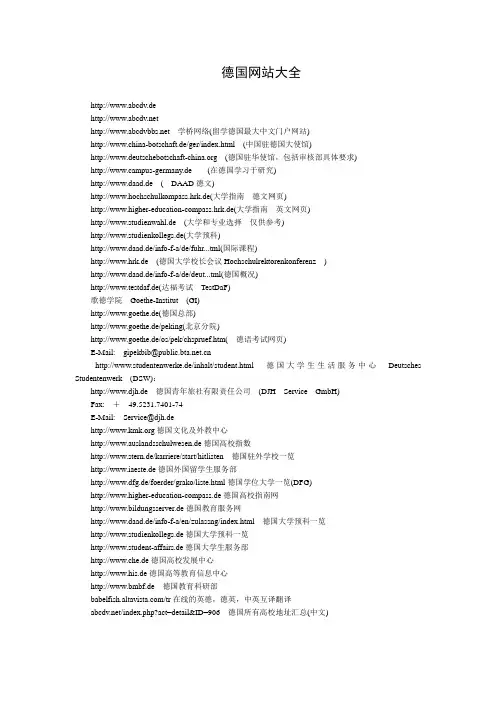
德国网站大全http://www.abcdv.de学桥网络(留学德国最大中文门户网站)http://www.china-botschaft.de/ger/index.html(中国驻德国大使馆)(德国驻华使馆,包括审核部具体要求)http://www.campus-germany.de(在德国学习于研究)http://www.daad.de(DAAD德文)http://www.hochschulkompass.hrk.de(大学指南德文网页)http://www.higher-education-compass.hrk.de(大学指南英文网页)http://www.studienwahl.de(大学和专业选择仅供参考)http://www.studienkollegs.de(大学预科)http://www.daad.de/info-f-a/de/fuhr...tml(国际课程)http://www.hrk.de(德国大学校长会议Hochschulrektorenkonferenz)http://www.daad.de/info-f-a/de/deut...tml(德国概况)http://www.testdaf.de(达福考试TestDaF)歌德学院Goethe-Institut(GI)http://www.goethe.de(德国总部)http://www.goethe.de/peking(北京分院)http://www.goethe.de/os/pek/chspruef.htm(德语考试网页)E-Mail:gipekbib@http://www.studentenwerke.de/inhalt/student.html德国大学生生活服务中心Deutsches Studentenwerk(DSW):http://www.djh.de德国青年旅社有限责任公司(DJH Service GmbH)Fax:+49.5231.7401-74E-Mail:Service@djh.de德国文化及外教中心http://www.auslandsschulwesen.de德国高校指数http://www.stern.de/karriere/start/hitlisten德国驻外学校一览http://www.iaeste.de德国外国留学生服务部http://www.dfg.de/foerder/grako/liste.html德国学位大学一览(DFG)http://www.higher-education-compass.de德国高校指南网http://www.bildungsserver.de德国教育服务网http://www.daad.de/info-f-a/en/zulassng/index.html德国大学预科一览http://www.studienkollegs.de德国大学预科一览http://www.student-affairs.de德国大学生服务部http://www.che.de德国高校发展中心http://www.his.de德国高等教育信息中心http://www.bmbf.de德国教育科研部/tr在线的英德,德英,中英互译翻译/index.php?act=detail&ID=906德国所有高校地址汇总(中文)德国媒体政府网站一、报刊杂志德国的各大报刊杂志都有自己的网址,而且网址和报刊杂志同名。
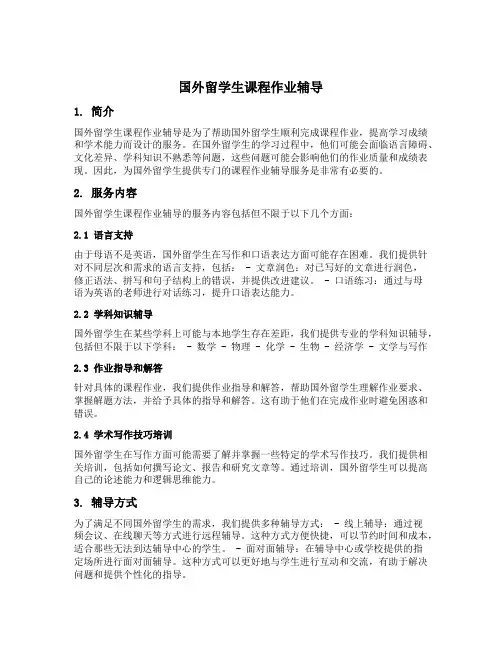
国外留学生课程作业辅导1. 简介国外留学生课程作业辅导是为了帮助国外留学生顺利完成课程作业,提高学习成绩和学术能力而设计的服务。
在国外留学生的学习过程中,他们可能会面临语言障碍、文化差异、学科知识不熟悉等问题,这些问题可能会影响他们的作业质量和成绩表现。
因此,为国外留学生提供专门的课程作业辅导服务是非常有必要的。
2. 服务内容国外留学生课程作业辅导的服务内容包括但不限于以下几个方面:2.1 语言支持由于母语不是英语,国外留学生在写作和口语表达方面可能存在困难。
我们提供针对不同层次和需求的语言支持,包括: - 文章润色:对已写好的文章进行润色,修正语法、拼写和句子结构上的错误,并提供改进建议。
- 口语练习:通过与母语为英语的老师进行对话练习,提升口语表达能力。
2.2 学科知识辅导国外留学生在某些学科上可能与本地学生存在差距,我们提供专业的学科知识辅导,包括但不限于以下学科: - 数学 - 物理 - 化学 - 生物 - 经济学 - 文学与写作2.3 作业指导和解答针对具体的课程作业,我们提供作业指导和解答,帮助国外留学生理解作业要求、掌握解题方法,并给予具体的指导和解答。
这有助于他们在完成作业时避免困惑和错误。
2.4 学术写作技巧培训国外留学生在写作方面可能需要了解并掌握一些特定的学术写作技巧。
我们提供相关培训,包括如何撰写论文、报告和研究文章等。
通过培训,国外留学生可以提高自己的论述能力和逻辑思维能力。
3. 辅导方式为了满足不同国外留学生的需求,我们提供多种辅导方式: - 线上辅导:通过视频会议、在线聊天等方式进行远程辅导。
这种方式方便快捷,可以节约时间和成本,适合那些无法到达辅导中心的学生。
- 面对面辅导:在辅导中心或学校提供的指定场所进行面对面辅导。
这种方式可以更好地与学生进行互动和交流,有助于解决问题和提供个性化的指导。
4. 辅导师资我们的辅导师资由经验丰富、专业知识扎实的老师组成。
他们具有以下优势: - 母语为英语,具备良好的语言表达能力。
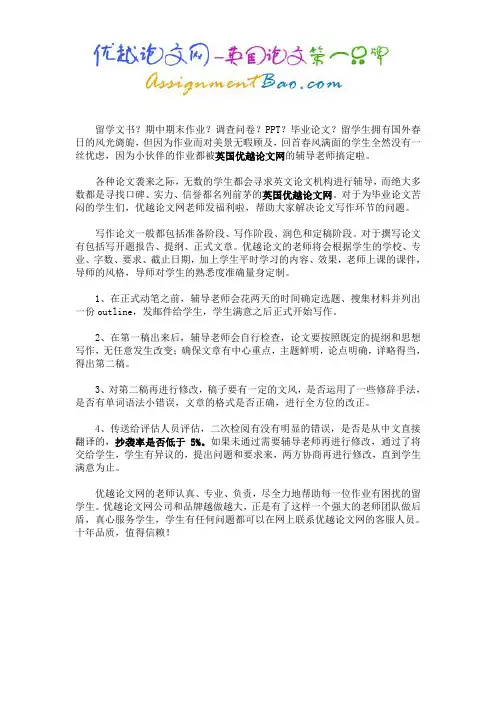
留学文书?期中期末作业?调查问卷?PPT?毕业论文?留学生拥有国外春日的风光旖旎,但因为作业而对美景无暇顾及,回首春风满面的学生全然没有一丝忧虑,因为小伙伴的作业都被英国优越论文网的辅导老师搞定啦。
各种论文袭来之际,无数的学生都会寻求英文论文机构进行辅导,而绝大多数都是寻找口碑、实力、信誉都名列前茅的英国优越论文网。
对于为毕业论文苦闷的学生们,优越论文网老师发福利啦,帮助大家解决论文写作环节的问题。
写作论文一般都包括准备阶段、写作阶段、润色和定稿阶段。
对于撰写论文有包括写开题报告、提纲、正式文章。
优越论文的老师将会根据学生的学校、专业、字数、要求、截止日期,加上学生平时学习的内容、效果,老师上课的课件,导师的风格,导师对学生的熟悉度准确量身定制。
1、在正式动笔之前,辅导老师会花两天的时间确定选题、搜集材料并列出一份outline,发邮件给学生,学生满意之后正式开始写作。
2、在第一稿出来后,辅导老师会自行检查,论文要按照既定的提纲和思想写作,无任意发生改变;确保文章有中心重点,主题鲜明,论点明确,详略得当,得出第二稿。
3、对第二稿再进行修改,稿子要有一定的文风,是否运用了一些修辞手法,是否有单词语法小错误,文章的格式是否正确,进行全方位的改正。
4、传送给评估人员评估,二次检阅有没有明显的错误,是否是从中文直接翻译的,抄袭率是否低于5%。
如果未通过需要辅导老师再进行修改,通过了将交给学生,学生有异议的,提出问题和要求来,两方协商再进行修改,直到学生满意为止。
优越论文网的老师认真、专业、负责,尽全力地帮助每一位作业有困扰的留学生。
优越论文网公司和品牌越做越大,正是有了这样一个强大的老师团队做后盾,真心服务学生,学生有任何问题都可以在网上联系优越论文网的客服人员。
十年品质,值得信赖!。
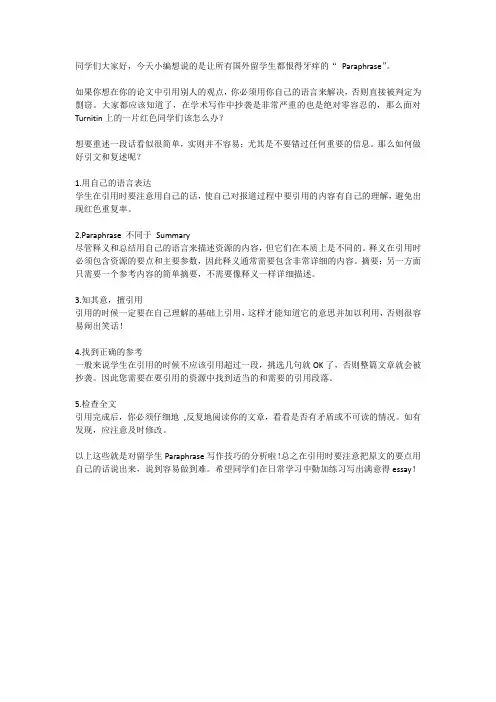
同学们大家好,今天小编想说的是让所有国外留学生都恨得牙痒的“Paraphrase”。
如果你想在你的论文中引用别人的观点,你必须用你自己的语言来解决,否则直接被判定为剽窃。
大家都应该知道了,在学术写作中抄袭是非常严重的也是绝对零容忍的,那么面对Turnitin上的一片红色同学们该怎么办?
想要重述一段话看似很简单,实则并不容易;尤其是不要错过任何重要的信息。
那么如何做好引文和复述呢?
1.用自己的语言表达
学生在引用时要注意用自己的话,使自己对报道过程中要引用的内容有自己的理解,避免出现红色重复率。
2.Paraphrase 不同于Summary
尽管释义和总结用自己的语言来描述资源的内容,但它们在本质上是不同的。
释义在引用时必须包含资源的要点和主要参数,因此释义通常需要包含非常详细的内容。
摘要:另一方面只需要一个参考内容的简单摘要,不需要像释义一样详细描述。
3.知其意,擅引用
引用的时候一定要在自己理解的基础上引用,这样才能知道它的意思并加以利用,否则很容易闹出笑话!
4.找到正确的参考
一般来说学生在引用的时候不应该引用超过一段,挑选几句就OK了,否则整篇文章就会被抄袭。
因此您需要在要引用的资源中找到适当的和需要的引用段落。
5.检查全文
引用完成后,你必须仔细地,反复地阅读你的文章,看看是否有矛盾或不可读的情况。
如有发现,应注意及时修改。
以上这些就是对留学生Paraphrase写作技巧的分析啦!总之在引用时要注意把原文的要点用自己的话说出来,说到容易做到难。
希望同学们在日常学习中勤加练习写出满意得essay!。
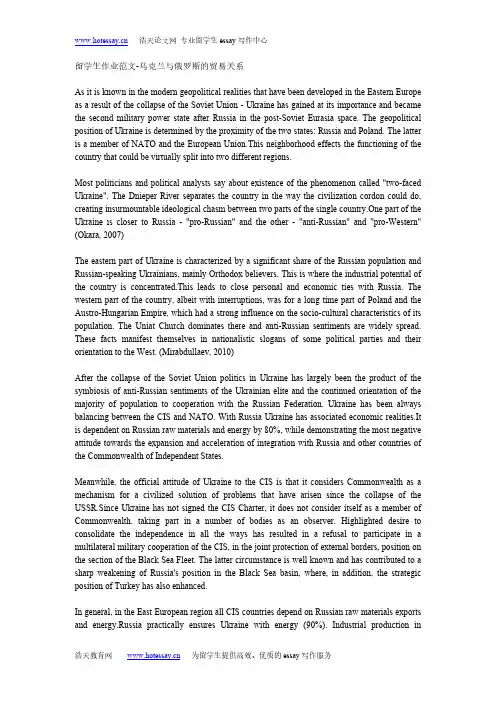
留学生作业范文-乌克兰与俄罗斯的贸易关系As it is known in the modern geopolitical realities that have been developed in the Eastern Europe as a result of the collapse of the Soviet Union - Ukraine has gained at its importance and became the second military power state after Russia in the post-Soviet Eurasia space. The geopolitical position of Ukraine is determined by the proximity of the two states: Russia and Poland. The latter is a member of NATO and the European Union.This neighborhood effects the functioning of the country that could be virtually split into two different regions.Most politicians and political analysts say about existence of the phenomenon called "two-faced Ukraine". The Dnieper River separates the country in the way the civilization cordon could do, creating insurmountable ideological chasm between two parts of the single country.One part of the Ukraine is closer to Russia - "pro-Russian" and the other - "anti-Russian" and "pro-Western" (Okara, 2007)The eastern part of Ukraine is characterized by a significant share of the Russian population and Russian-speaking Ukrainians, mainly Orthodox believers. This is where the industrial potential of the country is concentrated.This leads to close personal and economic ties with Russia. The western part of the country, albeit with interruptions, was for a long time part of Poland and the Austro-Hungarian Empire, which had a strong influence on the socio-cultural characteristics of its population. The Uniat Church dominates there and anti-Russian sentiments are widely spread. These facts manifest themselves in nationalistic slogans of some political parties and their orientation to the West. (Mirabdullaev, 2010)After the collapse of the Soviet Union politics in Ukraine has largely been the product of the symbiosis of anti-Russian sentiments of the Ukrainian elite and the continued orientation of the majority of population to cooperation with the Russian Federation. Ukraine has been always balancing between the CIS and NATO. With Russia Ukraine has associated economic realities.It is dependent on Russian raw materials and energy by 80%, while demonstrating the most negative attitude towards the expansion and acceleration of integration with Russia and other countries of the Commonwealth of Independent States.Meanwhile, the official attitude of Ukraine to the CIS is that it considers Commonwealth as a mechanism for a civilized solution of problems that have arisen since the collapse of the USSR.Since Ukraine has not signed the CIS Charter, it does not consider itself as a member of Commonwealth, taking part in a number of bodies as an observer. Highlighted desire to consolidate the independence in all the ways has resulted in a refusal to participate in a multilateral military cooperation of the CIS, in the joint protection of external borders, position on the section of the Black Sea Fleet. The latter circumstance is well known and has contributed to a sharp weakening of Russia's position in the Black Sea basin, where, in addition, the strategic position of Turkey has also enhanced.In general, in the East European region all CIS countries depend on Russian raw materials exports and energy.Russia practically ensures Ukraine with energy (90%). Industrial production inUkraine and its end products is closely tied to cooperation with other CIS countries, primarily Russia.This dependence is 70%. However, Ukraine has a negative attitude to the expansion and acceleration of integration with Russia and within the CIS (Mirabdullaev, 2010).Ukrainian and Russian society, like the vast majority of societies with state socialism past began their movement to a market economy and democracy at the turn of 1980-1990s with similar resources. In the collapse of the Soviet system they lacked:Strong stateDeveloped civil society, able to compensate for the "failures" of the state and other public institutionsInitial capitals, developed markets and relevant skills (Kucenko, 2006).Since 1992 the privatization of small and large enterprises through an open tender procedure has started in Ukraine, and from 1995 to 1999 the process of mass voucher privatization took place. However, as a result of large-scale voucher privatization millions of citizens, contrary to expectations, did not become real owners. For example, in Ukraine 19 million shareholders became owners in name only, not even filling out the ownership of the shares acquired. Non-cash privatization led to the acquisition of ownership by insiders, which caused a slow demand for institutional reforms. In turn, the lack of developed market institutions leads to the fact that transactions on the secondary market encourage the concentration of ownership in the hands of a small number of politically-engaged owners. On this basis, very quickly were formed a "redistributive coalitions", which led to the crystallization of the economic dominance of several major business and political groups of "oligarchic" nature (Kucenko, 2006).This feature quiet well displays a system of internal and external factors, the emergence and development of political crisis in Ukraine.However, it suggests that substantial basis of this system is the fact that Ukraine is oligarchic state. This is a pivotal component of the internal economic factors. (Koryakina_1)Ukraine from 1994 until 2004 was ruled by President Leonid Kuchma and group of powerful business men so-called "oligarchs" who supported him during the elections in 1999. His policies did not differ by significant reforms, but were characterized by corruption and infringement of human rights (Woehrel, S., 2009).Control over the proceeds of all revenues from oil and gas resources on account business structures, controlled by a "clan" of Leonid Kuchma, gave oligarchs economic weight and unlimited opportunity to influence political decisions. This economic factor has contributed to the deepening crisis in politics due to the power crisis 1999 - 2000 periods.However, it should be once more noted that Ukraine, like most of the CIS countries, is economically dependent on Russia.This is evidenced by a number of significant facts. Back in 1999, Ukraine was considered as hopeless defaulter for gas.On that period it was owed toGazprom $ 1,065 billion.Moreover, Russia was supplying gas to Ukraine for only $ 34 per thousand cubic meters. Then it became obvious that if E. Primakov (Russian Prime-Minister at that time) would not visit Kiev, the Ukrainian would suffer worst economic collapse, contributing to worsening Crisis in politics (Koryakina, 2006).These events were linked to the attempt of the Ukrainian president to blackmail Moscow that was associated with Ukraine's desire to enter NATO. In 1998 in response to a "public flirtation" of the Ukrainian authorities with "the West" took place the breach of the Russian - Ukrainian energy relations.In any way, Ukraine's geopolitical position between Russia and the European Union is often used by Ukrainian politicians to pressure the Russian leadership to the acquisition of certain economic and political advantages (Mirabdullaev, 2010).Current situationSince the Soviet collapse, relations between Ukraine and Russia were characterized byboth elements of cooperation and conflict. Difficult decisions also include questions regarding the Crimea and the Black Sea Fleet (BSF) that locates its Russian part in Sevastopol. On May 31, 1997 the Russian-Ukrainian Treaty on Friendship, Cooperation and partnership was signed, which has resolved existed claims of both countries against each other, including territorial, which meant the end of the dispute over the ownership of the Crimea. Since independence, Ukraine is pursuing a multi-policy which was based on the task of ensuring self-sufficiency, including the military political issues (Kuzio, 2003).Relations with NATO are regulated within the Council of Ukraine -NATO. Ukraine has actively participated in the program: "Partnership for Peace" (Mirabdullaev, 2010)In 2005 a new leadership of Ukraine led by president Viktor Yushchenko who came to the power after the Orange Revolution made a much greater emphasis on the pursuit to integrate the country into NATO and the European Union. Kiev confirmed commitment assumed by the military and political obligations in relation to Russia, in particular, an agreement on BSF in Crimea Peninsula before 2017. Some experts believe that the presence of the Russian base in Crimea closes the path of Ukraine's accession to NATO. Indeed, one of the conditions of admission of new NATO members is the absence of military bases of other states on their territory.In this context, Russia raises some concerns about Ukraine's foreign policy.It envisages the tendency of the gradual transformation of Ukraine into one of the centers of power against Russia. (Kropacheva, 2006:16)To date, we can obviously assume that political system of Ukraine during the presidency of Viktor Yushchenko (2005-2010) was in a state of pronounced protracted crisis.It is characterized by duration and ambiguous episodic manifestation of trends in the exacerbating of the crisis in the politics of the State.The crisis in Ukrainian politics, determined by economic problems was caused by a new exacerbation of problems related to the Russian - Ukrainian "gas" relationships. Until 2005, theRussian side carried out prepayment for about 200 - 250 $ million for gas transit via Ukraine to Europe.At the same time Ukrainian consumers were paying for consumption of Russian gas at a price two times lower than the market price. The requirement of "orange" authorities to Russia paying for gas transit to the market price, in fact, contributed to the start of the new direction of development of the political crisis in Ukraine.Statement by RAO "Gazprom", in response to claims of Ukraine that the price for gas supplies to Kiev will raise to 55 - 69% (i.e. to 110 - 160 $ per 1000 cubic meters) could have extremely negative impact on domestic economic position of the Ukrainian state. Instead of seeking consensus, Yulia Tymoshenko (former Prime minister of the country), implementing plans for the U.S. rupture of economic ties with Russia, initiated a project pipeline "Iran - Europe", which is planned to supply gas to Ukraine from Iran instead of Russia (Koryakina, 2006).. It must be said, that the project would require considerable cost for Ukrainian budget which would impact the welfare of the population taking into account the economically weak stateThe political crisis in Ukraine in 2005, associated with the resignation of Tymoshenko was due not only to internal problems in the country, but also to the "gas" split of the Ukrainian political elites to find supporters of a compromise relations with Russia and his opponents. Continued demand from Russia to calculate market prices for gas transit and the reluctance for the same price to pay for energy supplies led to the fact that January 1, 2006 gas supplies to Ukraine were halted. Because of the self-take of gas from the pipe by the Ukrainian side gas supply to Europe was stopped, which contributed for signing a new contract between Ukraine and Russia and within two days the gas supply was restored (Woehrel, S., 2009).Consequently, the substantial foundation of foreign economic factors emergence and development of the political crisis in Ukraine is characterized by imbalance in the socio-political and economic relations caused by the installation of the U.S., orienting the "orange" political elites to break economic ties with Russia with respect to which Ukraine is economically dependent on state, mostly in raw materials industries (Koryakina,, 2006).The last gas crisis that occurred in 2009 was caused by inability of the two sides to reach agreement on a price for the supply of gas and Ukraine's debt to Gazprom. This time the gas crisis has affected not only Ukraine but also Europe.Finding other facts of gas self-taken on January 6 Russia cut off gas supplies to Europe for two weeks until the new agreement was reached. The EU was concerned about what is happening in Ukraine, as many countries within the Union have been seriously affected due to the incident.All these events together have contributed to the construction of a new gas pipelines: Nord Stream (under the Baltic See) and South Stream (trough Balkans) bypassing Ukraine. Construction of the Nord Stream has already begun, while the South Stream is not available at an early date. Construction of the latter would significantly affect the transport infrastructure of Ukraine that would significantly reduce its income. And, furthermore, it will enable Russia to exert pressure on Ukraine in solving of other problems (Woehrel, S., 2009).These facts suggest that attempts to break the economic relations with Russia have extremely negative impact on domestic economic and, hence, the internal political situation in Ukraine.Areas of economic cooperationThe high level of industrial development of Soviet Union was achieved through the so-called unified economic complex. This is the most obvious reason why economic relations between Ukraine and Russia were affected after the collapse of USSR - their interdependence of each other. This is explained by the fact that Ukraine produced only 20-30% of the total amount of the production cycle, whereas 70-80% of the remaining products were manufactured or supplied for the assembly from the other Union republics. Unfortunately, relations with other former Soviet republics were the same and all integrative processes which were created within the Soviet Union during the rupture of economic ties have been lost at the both micro and macro levels (Pylypenko, 2007).If during soviet times it was possible to find demand on Ukrainian goods within the soviet republics due to the presence of economic ties within the USSR that has actually been a variant of economic and monetary union, after its collapse and annihilation of all old business links and supply chains volumes of industrial production in Ukraine have decreased considerably, e.g.: production of mineral fertilizers decreased by 50%, chemical fibers and man-made yarns - by 6 times, plants protection agents by 50 times ( NSD, 2009).Thus, the reorientation of the mining industry to world markets to the detriment of the national manufacturing sector has not only reduced the domestic production in both countries, but also the volume of bilateral trade: The bilateral trade volume since 1996 to 1999 decreased from $ 14.4 billion to $ 8 billion or 55, 5%, while Russia's share in the Ukrainian commodity exports declined from 38, 7% to 20, 7%.Inability to solve economic problems while maintaining a high interdependence of economies has become one of the causes of economic conflict between Ukraine and Russia. Direct consequence of the rupture of cooperation ties has been the decline of high-tech production; fall in profitability, reduction of revenue and, as a result - degradation of people's welfare, unemployment and the risk of social discontent.At the same time, in terms of use of various schemes of tax evasion in the sphere of foreign economic activity by businessmen and the lack of effective control over exports and imports, increased foreign exchange earnings from commodity exports did not contribute to a qualitative improvement in the economy, because the gains from exports mainly received the business organizations rather than the economy in general. (NSD, 2009)Reorientation of trade relations between the two countries began with the year 2000, when, after a long period of decline the first recorded growth of mutual trade took place.In 2004 the total trade turnover between Ukraine and Russia has reached $ 20.350 billion, which is almost 2 times more than in 1999. Ukrainian exports to Russia during this period increased by 1.8 times, Russian imports to Ukraine - by 2, 1 times (Table 1).In 2001 - 2002 important bilateral documents have been signed, in particular, the program of cross-border and interregional cooperation, an intergovernmental memorandum on the principles of non-use of special measures regarding the import of goods originated from the customs territories of the parties, agreement on strategic cooperation in the gas sector and other (NSD, 2009).Despite the cooling of relations in the political sphere, followed by the presidential elections in Ukraine in 2004, economic cooperation between Ukraine and Russia continued to develop. So, according to State Statistics Committee of Ukraine, Ukraine's total foreign trade turnover in goods and services from Russia increased, compared with the previous year, in 2006 - by 12, 1%, in 2007 - by 28, 4% in 2008 - by 18, 7%.Let us now have more closer look at some issues of the bilateral trade between two countries. As it becomes clear from the aforementioned table, volumes of the bilateral trade between two countries have faced an increase between 1998 and 2006. Both Ukrainian exports to Russia as well as Ukrainian imports from Russia have increased in absolute terms from $ 5.5 bn (export) and $ 7.3 bn (import) in 1998 to respectively $ 11.8 bn (export) and $ 14.4 bn (import) in 2006. However, if we then take relative terms in account we see that both Ukrainian export and import to and from Russia have decreased from 31 percent point of total exports in 1998 to 26 percent points in 2006 and for imports from 46 percent points in 1998 to 30 percent points in 2006. From our point of view this controversial picture can be described by means of several assumptions. First is that during the discussed period the structure of inter-state trade has probably been changed, which has been reflected in the decrease of the Russian share in Ukrainian trade itself. Secondly, it can be that in absolute terms Ukrainian foreign trade has been increasing by higher rates than those between Ukraine and Russia. Finally, the reason can be that the period between 1998 and 2006 can itself reflect controversial data and could represent different trends and different sub-periods. Indeed, if we split given period into two sub-periods of 1998-2004 and 2004-2006 we see the decreasing shares of the Ukrainian exports to Russia in the first sub-period, whereas in 2004-2006 this share has started to increase from 21.6 percent points in 2004 to 26 percent in 2006.Additional data for 2007 and 2008 states that Ukrainian export to Russia increased to 28 percent of total exports in 2007 and remained at the same level in 2008 [1] . In the same time the downward sloping trend of the Ukrainian imports from Russia as a share of total imports continued to prevail and constituted 27 and 22 [2] percent points for 2007 and 2008 respectively. So, on the one hand, we see two sub-periods with different trends for exports' share changes: decreasing between 1998 and 2004 and increasing between 2004 and 2008, on the other hand - volumes of Ukrainian imports (as share in total imports) from Russia have been constantly decreasing between 1998 and 2008 and were halved as a share of total imports by 2008 comparing with 1998. By means of its exports' growth in 2004-2008 Ukraine has also been able to decrease its negative balance in trade with Russia from - $ 5.35 bn in 2006 to - $ 3.67 bn in 2008 [3] . If we try to have a more detailed and closer look at the structure of the Ukrainian foreign trade with Russia in 2004-2008 we will see the following picture.Ukrainian economy continued to stay dependant on Russian imports as it was represented by energy commodities and raw materials (46,8 percent and 42,8 percent of total Russian imports to Ukraine in 2007 and 2008 respectively). On the other hand in Ukrainian exports to Russia prevailed products with middle and high processing degree as well as services (in 2008 exports to Russia were presented by machinery products (32 percent), metallurgy products (20%) and services (20%). This means that the structure of Ukrainian exports seems to be more diversified comparing to that of Russian imports that can be viewed as a positive moment and possible comparative advantage (NSD, 2009).However, it should be stated that the bilateral trade between the countries has been highly influenced by the turmoil of global economic and financial crises in the end of 2008 and throughout 2009.Source: (NSD, 2009, 2009: 18)It is clear from the chart that Ukrainian exports to Russia as well as Russian imports decreased dramatically in 2008 - IQ 2009 that highlights high dependence of both countries on the international economics as well as similar trends within the economies discussed. We would also like to note that as a result of such decrease the share of energy commodities in Russian imports to Ukraine increased to 66 percent that once again highlights critical dependency of Ukrainian economy on energy imports from Russia. In its turn in Ukrainian exports to Russia share of services has considerably increased to 34% that probably indicates possibilities for further growth if Ukraine will be able enhance the quality of its transport, construction and financial services exported to Russia.Concluding it is possible to say that trade relations between Ukraine and Russia have experienced different periods of oppositely directed trends as mutual trade has stagnated in 1990-1999, then faced the increase in 2000-2008 and decreased again in 2008-2009. This, once again, states about an ambiguity and complexity of economic relations between two countries.。
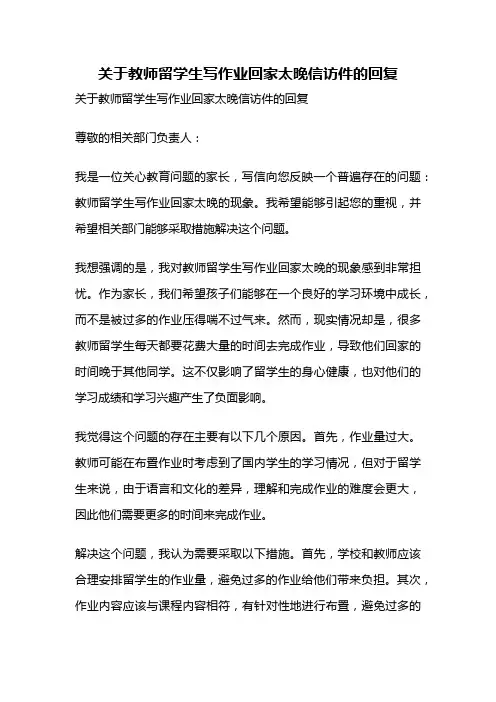
关于教师留学生写作业回家太晚信访件的回复关于教师留学生写作业回家太晚信访件的回复尊敬的相关部门负责人:我是一位关心教育问题的家长,写信向您反映一个普遍存在的问题:教师留学生写作业回家太晚的现象。
我希望能够引起您的重视,并希望相关部门能够采取措施解决这个问题。
我想强调的是,我对教师留学生写作业回家太晚的现象感到非常担忧。
作为家长,我们希望孩子们能够在一个良好的学习环境中成长,而不是被过多的作业压得喘不过气来。
然而,现实情况却是,很多教师留学生每天都要花费大量的时间去完成作业,导致他们回家的时间晚于其他同学。
这不仅影响了留学生的身心健康,也对他们的学习成绩和学习兴趣产生了负面影响。
我觉得这个问题的存在主要有以下几个原因。
首先,作业量过大。
教师可能在布置作业时考虑到了国内学生的学习情况,但对于留学生来说,由于语言和文化的差异,理解和完成作业的难度会更大,因此他们需要更多的时间来完成作业。
解决这个问题,我认为需要采取以下措施。
首先,学校和教师应该合理安排留学生的作业量,避免过多的作业给他们带来负担。
其次,作业内容应该与课程内容相符,有针对性地进行布置,避免过多的重复练习。
此外,教师应该加强与留学生的沟通,了解他们的学习进度和能力,调整作业难度,以保证他们能够有效地完成作业。
同时,家长也应该积极参与孩子的学习,与教师进行沟通,共同关注留学生的学习情况。
我希望相关部门能够重视这个问题,并采取切实有效的措施解决。
留学生是我国未来的栋梁之材,他们应该得到良好的学习环境和充分的关怀。
我相信,只要各方共同努力,我们一定能够解决这个问题,为留学生提供更好的学习条件和机会。
再次感谢您的关注和支持,希望能得到您的回复并解决这个问题。
祝愿教育事业蓬勃发展!此致。
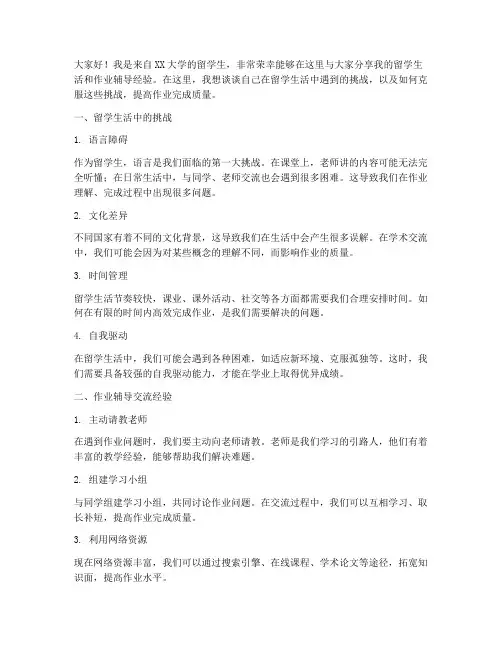
大家好!我是来自XX大学的留学生,非常荣幸能够在这里与大家分享我的留学生活和作业辅导经验。
在这里,我想谈谈自己在留学生活中遇到的挑战,以及如何克服这些挑战,提高作业完成质量。
一、留学生活中的挑战1. 语言障碍作为留学生,语言是我们面临的第一大挑战。
在课堂上,老师讲的内容可能无法完全听懂;在日常生活中,与同学、老师交流也会遇到很多困难。
这导致我们在作业理解、完成过程中出现很多问题。
2. 文化差异不同国家有着不同的文化背景,这导致我们在生活中会产生很多误解。
在学术交流中,我们可能会因为对某些概念的理解不同,而影响作业的质量。
3. 时间管理留学生活节奏较快,课业、课外活动、社交等各方面都需要我们合理安排时间。
如何在有限的时间内高效完成作业,是我们需要解决的问题。
4. 自我驱动在留学生活中,我们可能会遇到各种困难,如适应新环境、克服孤独等。
这时,我们需要具备较强的自我驱动能力,才能在学业上取得优异成绩。
二、作业辅导交流经验1. 主动请教老师在遇到作业问题时,我们要主动向老师请教。
老师是我们学习的引路人,他们有着丰富的教学经验,能够帮助我们解决难题。
2. 组建学习小组与同学组建学习小组,共同讨论作业问题。
在交流过程中,我们可以互相学习、取长补短,提高作业完成质量。
3. 利用网络资源现在网络资源丰富,我们可以通过搜索引擎、在线课程、学术论文等途径,拓宽知识面,提高作业水平。
4. 做好笔记和总结在上课过程中,我们要认真听讲,做好笔记。
课后及时总结,梳理知识点,有助于提高作业质量。
5. 适当休息,保持良好心态在留学生活中,我们要学会合理安排时间,保证充足的睡眠。
同时,保持良好的心态,面对挑战。
三、建议与展望1. 加强语言学习提高英语水平是留学生活的关键。
我们要充分利用课余时间,加强英语听说读写训练。
2. 深入了解当地文化了解当地文化,有助于我们更好地融入当地生活。
同时,在学术交流中,我们可以运用当地文化知识,提高作业质量。
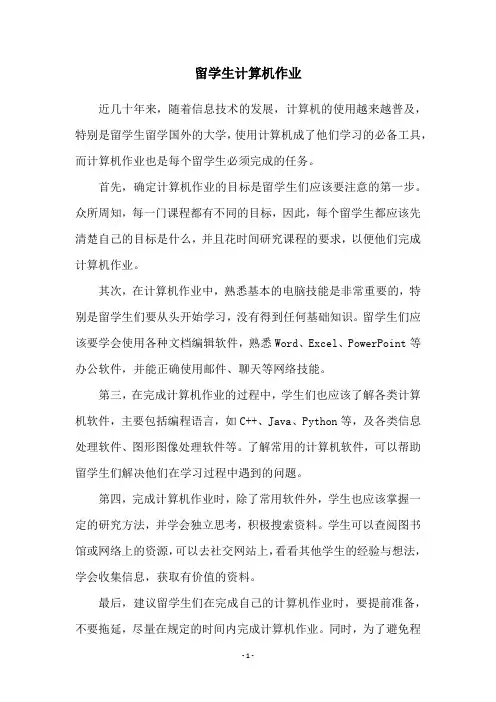
留学生计算机作业
近几十年来,随着信息技术的发展,计算机的使用越来越普及,特别是留学生留学国外的大学,使用计算机成了他们学习的必备工具,而计算机作业也是每个留学生必须完成的任务。
首先,确定计算机作业的目标是留学生们应该要注意的第一步。
众所周知,每一门课程都有不同的目标,因此,每个留学生都应该先清楚自己的目标是什么,并且花时间研究课程的要求,以便他们完成计算机作业。
其次,在计算机作业中,熟悉基本的电脑技能是非常重要的,特别是留学生们要从头开始学习,没有得到任何基础知识。
留学生们应该要学会使用各种文档编辑软件,熟悉Word、Excel、PowerPoint等办公软件,并能正确使用邮件、聊天等网络技能。
第三,在完成计算机作业的过程中,学生们也应该了解各类计算机软件,主要包括编程语言,如C++、Java、Python等,及各类信息处理软件、图形图像处理软件等。
了解常用的计算机软件,可以帮助留学生们解决他们在学习过程中遇到的问题。
第四,完成计算机作业时,除了常用软件外,学生也应该掌握一定的研究方法,并学会独立思考,积极搜索资料。
学生可以查阅图书馆或网络上的资源,可以去社交网站上,看看其他学生的经验与想法,学会收集信息,获取有价值的资料。
最后,建议留学生们在完成自己的计算机作业时,要提前准备,不要拖延,尽量在规定的时间内完成计算机作业。
同时,为了避免程
序出现问题,最好定期备份自己的文件,以免后悔莫及。
总之,完成计算机作业非常重要,留学生们要严格按照要求完成,充分发挥自己的能力,加强自己的学习,提高自身的素质。
作业题目:过程性考核作业1试题列表单选题1、20世纪()年代是偏误分析的鼎盛时期。
A50B60C70D80学生答案:C2、关于偏误的描述,正确的是()A成系统的、多发的、有规律的B成系统的、偶发的、有规律的C成系统的、多发的、无规律的D不成系统的、多发的、有规律的学生答案:A3日本学生不分“p”和“f”属于()引起的语音偏误。
A母语负迁移B目的语知识负迁移C文化因素负迁移D学习环境影响学生答案:A4留学生把“他不高兴地走了”“说成“他不高兴了,他走了”,这属于()策略。
A迁移B泛化C简化D失误学生答案:C5()是指学习者对目的语已经形成了一定的系统意识,但对某些规则理解得不够完整而导致的偏误。
A系统前偏误B系统偏误C系统后偏误D超系统偏误学生答案:B6收集偏误的来源不包括()。
A学生的作业B谈话C凭经验想象D翻译作品学生答案:C7偏误纠正的原则不包括()。
A符合地道的汉语B不违背原句作者意愿C最简化D接近学生水平学生答案:A8汉语中属于塞音的一组是()Bf h x sCm n l rDb p d t学生答案:D9把“怀(huái)”发成“还(hái)”的音,属于()偏误类型。
A发音动程较小B发音比较饱满C介音丢失D口腔紧张学生答案:C10汉语声调类型中第()声和第()声的偏误现象比较多。
A一二B二三C三四D一四学生答案:B11学习者学习第二语言过程中所犯的错误,并不能都归结为受到母语的影响。
()A正确B错误学生答案:A12从语言教学的角度来看,失误和偏误都是偏误分析的对象。
()A正确B错误学生答案:B13最初阶段的偏误分析与对比分析没有本质的区别。
()A正确B错误学生答案:A14母语负迁移所造成的偏误,在学习的中高级阶段占优势。
()A正确B错误学生答案:B15横向收集,指教师收集学习者某一特定阶段出现的偏误。
A正确B错误学生答案:A16误代指句子中多了不该出现的语言单位。
()A正确B错误学生答案:B17汉语中有5个舌面元音。
留学生cs作业考试
随着科技的进步,越来越多的留学生前往海外学习,以求获得高科技学历,参加高端职业认证和评估考试,以便与他们的同龄人竞争。
计算机科学(CS)是其中一种显著的学科,它涵盖了计算机软件、硬件、系统结构等众多领域,而它的实施也是一个繁琐的过程。
在此,强调有效地通过CS作业考试,可能会给留学生带来更多的学习机会和就业机会,从而大大提高他们的未来职业前景。
首先,要想顺利通过CS作业考试,留学生必须对相关的学科有足够的了解,而这一切最终都归因于对基础知识的熟悉而深入的理解。
因此,作为基础知识的掌握,让学习者理解也是非常重要的,只有在这样的情况下,留学生才能够更好地理解知识,进而有效地应对CS作业考试。
此外,CS作业考试还需要留学生拥有良好的实践能力。
简而言之,实践能力就是指通过实践来掌握新知识以及及时更新老知识,并将其运用到实际工作中去。
实践能力的培养需要留学生具备良好的实践性学习方法,在学习完知识的基础上,通过实践方式来熟练掌握相关技术,同时进行实际应用。
最后,留学生在参加CS作业考试时,也需要具备良好的团队合作能力。
这里所指的团队合作能力,不仅包括学生的文化融入能力和学习交流能力,也包括学生的团队解决问题能力、知识准确分析问题能力以及合作策划、分配任务的能力,这些都是参加CS作业考试必不可少的要素。
总而言之,留学生参加CS作业考试,必须具备足够的知识背景、良好的实践能力以及良好的团队合作能力,以便顺利通过考试,同时帮助他们更好地实现自身的职业理想。
但最重要的是,留学生当中,每个人都应当坚持不懈地利用所学知识,善用跳出来的机会,把所学的技能运用到实践中去,以便在未来的职业发展中取得预期的成就。
留学生化学和化工作业辅导留学生化学和化工作业辅导 1考试教育可以为留学生提供全方位的服务,从出国前的课程预习、入学笔试面试到出国后的课程辅导。
同步课件、作业练习、论文写作、课程预习、选课指导、入学考试、课程不及格的投诉,都在考查和思考的范围之内。
考斯可以为学员提供在线一对一的定制辅导,让学员打破时间和空间的限制,随时随地解决课程学习中遇到的问题。
留学生化学和化工作业辅导 21、VIP定制定制化辅导,深入学生学习弱项,针对学生学习问题进行有效性提升。
全方位VIP服务,从课程前期规划,到实际课程辅导,再到课后学习督导,全程提供范围。
课程内容基于学生实际学习情况,随时调整课堂进度,以满足学生学习需求。
2、指航计划帮助学生选择专业和课程,避免盲目选课。
学生可以选择任何他们想知道的专业和课程。
同步大学课程,根据学生的实际学习情况,帮助学生选择最适合自己发展的专业和学科。
明确选课目标,拓展各学科知识点,提高学术英语水平,提前适应海外教学方式。
3、起跑计划辅导学生准备专业课,赢在起跑线上,为后续学习打基础。
指导学生提前预习各种学术技能和专业课程。
4、迀跃计划为学生留学保驾护航。
涵盖了同步课件教学、课后作业讲解、考前复习冲刺、毕业论文指导等所有学术问题。
大学课程同步,课件素材同步,教学进度同步,评分标准同步。
虽然留学生化学化工工作指导线上的院校很多,但是优质院校不多。
学生要想尽快开始辅导外国学生化学化工操作,又不耽误学习进度,一定要选择一个靠谱的辅导机构,师资力量强。
综上所述,考思教育绝对值得学生信任。
如果同学们想了解更多考思思的辅导情况,可以马上联系在线咨询师。
英国作业辅导——留学前必须掌握的英国作业形式众所周知,在英国要想顺利毕业,过五关斩六将是必须的,除了考试,最重要的就是作业。
而英国留学生的作业种类也很多,essay、report、网课、Exercise、Presentation、Reading……等等,细数起来有十几种,而且每一类作业的写作方法差异很大,很多留学生,特别是刚到英国的留学生,很难掌握所有类型的作业写作。
但是无论遇到哪种作业形式,希望在作业中取得高分是每个学生的希望,因为作业分数也是最终成绩一个非常重要的组成部分。
那我们来一起看看有哪些作业类型吧。
01 ReportReport可以说是对于国外大学学生来说最重要的笔头作业了。
通常理工科的学生在完成实验之后也需要完成小型Report。
Report对专业性的要求也是极其高的。
学生往往需要阅读和引用很多文献。
人文社科类的可能期末没有考试,那么Report就更加重要。
而工程类的学生在阅读各种资料的同时,还需要实验数据作为自己报告的支撑。
所以Report的完成可以说是耗时耗力。
英国留学生作业辅导02 EssayEssay这个单词很多人肯定也并不陌生。
在国外,人们都管话题作文和论文统称Essay。
可以看做是说明文,也可以是议论文。
而Essay本质上就是要给出自己的argument。
定好Topic,头脑风暴积累Idea并查阅资料,选择Thesis Statement(也就是这篇文章想陈述的想法),给Essay设计结构打好框架,写Body(主体),写Title, Introduction 和Conclusion,最后仔细的修改。
以上就是完成一篇Essay的基本步骤。
写essay遇到困难,可以联系考而思学习小管家哦。
英国留学生作业辅导03 Group Assignment/Project需要小组一起共同完成的作业在国外也是非常常见。
不仅让学生很好地巩固了课堂内的知识,同时也锻炼了学生的沟通协作和团队合作能力。
刚去到英国的留学生应该在适应当中了,比较独立的学生也许就已经融入到学习和生活当中了,课程繁重,作业多且难,新留学生们开始皱眉头了,听师哥师姐说,写作业经常到后半夜呢!但是也有许多的学生找了一家很靠谱的论文辅导机构帮忙构思作业,在写作中也能起到很大的作用,都说优越论文不错,到底怎么样呢?首先是优越论文网的介绍。
英国优越论文网听名字,对的,是英国本地的哦,自从成立以来经过了十多年的风风雨雨,成功地辅导了数以万计的留学生作业,其负责、诚信等美誉更加强了好的口碑。
辅导范围上,包括平常Essay写作、毕业论文完成、留学文书制作、PPT和调查问卷的制作,当然,以上内容包括全程辅导和修改润色。
辅导老师团队,优越论文网的辅导老师可称得上团队,因为涉及到文科。
理工科、医科、商科、艺术等领域,所以老师的范围也必须很广泛,并且他们都是英美等知名大学的研究生博士生。
各位老师认真、细心、负责等美好的品质共同为所有的留学生服务。
其次是优越论文网的服务流程。
1、留学生在各种作业中有任何的问题都可以随时在网上搜到优越论文网,可随时浏览官网,咨询客服老师,优越的客服是24小时在线哦,这是其他小机构做不到的!!学生在咨询后把自己的论文要求告知客服老师,客服老师会根据论文的情况和学生掌握的情况,甚至是导师上课的课件和上课风格找到最适合的辅导老师。
2、辅导老师先按照学生的要求确定选题,搜集素材,然后列出一个outline和素材一起给学生过目,同意后方可全面开始。
如果在中间各位留学生有问题可以及时提出来,老师给予修改。
3、客服老师在所有的过程中会连接留学生和辅导老师,任何问题都可以向客服老师反映。
在最后还会对辅导老师上交的全稿用专业的Turn it in检测系统进行检测,保证抄袭率在5%以下,有的甚至是100%原创。
所有的学生一律过关,有不少的还拿到了比较满意的分数呢!!好啦,以上就是英国优越论文网老师针对大家的疑问做的介绍,如果您还在为论文苦恼,欢迎随时咨询优越论文客服老师哦,随时解答您的问题!更多相关资讯,欢迎登陆英国优越论文官方网站浏览!。
美国高中留学生家庭作业是值得关注的,对于选择美国高中留学的留学生来说,都需要做哪些家庭作业呢,下面是360教育集团专家给出的分析。
英语作业
老师除了要留一些生词记忆作业外,大多是要求读教材,读小说,甚至看电影。
要求学生归纳总结出读书摘要,报告和书评。
有的英语作业还让学生作诗,编童话,看名著改编的电影等。
西班牙语作业
西班牙语作业也常常别出心裁,超出我国外语作业的定式。
讲课的老师是西班牙裔,老师们会出一些有关拉美西班牙语国家的经济,地理,历史和习俗等常识性问答题。
与国内高中外语教学强调背单词,记语法,读课本等方式相比,美国的外语教学更重视通过一门外语的学习,来了解那个国家的文化,使学生们通过对那个国家文化的热爱和好奇,产生对一门外语的兴趣。
比如一些美国小孩就是出于对中国功夫片和对日本动画片的喜欢,才决定学中文和日文的。
历史作业
通常老师会让学生读反映相关题材的小说,看历史纪录片。
比如,老师讲完“珍珠港事件”这段历史后,老师先布置读相关小说“广岛”,再安排学生看纪实片“珍珠港”,多角度加深学生们对这段历史的认识和理解。
而国内的历史课,只需要一盏灯,一本书,背到深夜12点,考试就会过关。
而在美国学校历史课就复杂多了,除了读书外,学生还要去图书馆查资料,网上下载相关图片,看纪录片谈感受,没有捷径可走,历史年代和史实固然要记住,但不动脑子不动手是很难完成作业的。
如上几点是对美国高中留学生家庭作业做出的介绍,希望引起大家的关注和注意,同时还需要引起大家重视的还有,大家最好咨询专业留学机构的建议。
各种论文作业来了,留学生们应该迎难而上。
作为英国本土注册的正规机构——优越论文,专业服务老师将要解决学生在写作论文方面的困难和疑问。
也许刚出国的学生会感到疑问,写作业为什么要找机构辅导呢?优越论文专业老师解答:即使是新留学生,现在也是到了上学期的中间了,平常论文作业会布置很多。
第一,与国内的课程不一样,数目明显增多;第二,课程难度加大;第三,全英文写作,不能带有中式英语的痕迹;第四,导师要求超级严格;第五,留学生醉心于异国优美风光。
鉴于以上原因,尤其是写毕业论文的留学生,选题定方向,找参考资料,整理之后写开题报告拟提纲,论文写作及修改,最后定稿等等环节,这样还不一定能毕业。
而专注于英文论文写作辅导的机构在这方面是很权威的,所以找一家靠谱的机构对于自己完成学业是很有帮助的。
很多学生在写英国论文的时候感受到了找辅导机构的必要性和重要性,但是面对无数的广告,非常疑惑该找个什么样的机构,什么样的机构可信呢?优越论文专业老师解答:当然是找个权威专业负责、信誉度高的机构啊。
优越论文就是这样的一家机构,权威在于是在英国本地的一家论文辅导机构,而且可以做到高端的研究生博士生,相比较于国内的一些自称很权威的机构,优越就不解释了。
专业在于优越的老师全都是国外重点大学毕业的研究生博士生,在学术上都有一定的业绩的人士,甚至还有外国大学的一些教师;而国内的一些机构的老师就是英语专八的学生而已,或是客服本身。
负责在于优越的客服人员一天24小时在线,这是其他机构做不到的,而且辅导老师会根据学生的自身情况、要求量身定做论文,在前期会拿出outline给学生看。
信誉度高在于通过率高达98%以上,在给学生定稿的时候会有一份用专业的Turn it in 检测系统查重,保证抄袭率在5%以下,甚至原创度是100%,而且保密性极好。
英国优越论文网, 是一家英国留学与论文作业辅导的专业正规品牌,在过去的10年时间里,帮助了英国高校学生顺利申请了一大批英国名校,以及辅导留学生们完成了coursework, assignment, essay, assignment, research proposal, presentation等各种文书的辅导,得到成千上万的留学生的真正认可。
优越论文网是遵循着高效率,高质服务,业务价格合理的原则对待每一位学生.我们带着200%的热情帮助每一个留学生同学在论文写作中避免抄袭与创作出原创学术论文;我们坚持高品质的留学申请服务, 我们的客服提供24小时在线一对一的沟通与服务;我们拥有最专业的评估团队,我们的turn-it-in系统检测帮助留学生朋友保证他们的论文原创性;同时,我们还有着庞大的英国院校师资力量支持等优势。
各位留学生以上提出的疑问,优越论文专业老师都进行了一一解答,有更多疑问欢迎咨询,以便优越能更好地服务,客服24小时在线哦!。